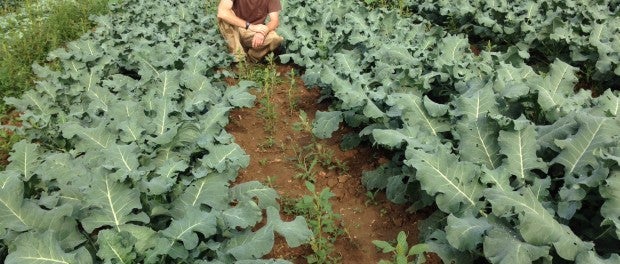Transitioning to Organic – New Report

FARMERS TRANSITIONING TO ORGANIC NEED PEOPLE-CENTERED SUPPORT SYSTEMS
New report details motivations and obstacles
for transition success
Farmers looking to transition to organic certification want personalized, high-contact support such as mentorships and one-on-one technical help, according to a joint report released by Oregon Tilth and Oregon State University’s (OSU) Center for Small Farms and Community Systems.
The transitioning to organic report, entitled, “Breaking New Ground: Farmer Perspectives on Organic Transition,” highlights key recommendations for organizations and agencies that can provide support in crop research, infrastructure and market development as well as shaping public policies for transition to organic production:
- Adopt a values-based approach to appeal to a wider audience of farmers
Farmers transitioning to organic are generally motivated to do so through an alignment of their personal values with benefits they ascribe to organic production.
- Provide individualized, in-person support
The top two methods of support desired were mentoring from experienced organic farmers and one-on-one technical assistance.
- Develop more effective weed (pest) management strategies
Effective outreach and support on weed and pest management in organic systems should include long-term trials, on-farm demonstrations and help farmers engage in participatory research.
- Learn more about the relationship between yield and successful transition
When discussing barriers associated with transitioning to organic, farmers and agricultural professionals commonly cite concerns involving reduced yield. However, survey respondents consistently ranked this obstacle far below many others.
“One thing the report makes clear is there is plenty of work to do for everyone interested in organic agriculture,” said Garry Stephenson, director of the OSU Center for Small Farms and Community Food Systems. “This includes solving production obstacles through research, developing markets, and local and regional infrastructure, and creating policy that supports farmers and ranchers who choose to transition to organic.”
The report exhibits responses from four categories of farmers, echoing long-standing concerns about costs, recordkeeping, on-farm production challenges, infrastructure and access to profitable markets.
“Recently, we’ve seen a lot of attention on how organic provides farmers economic opportunity,” said Sarah Brown, Oregon Tilth’s education director. “Farm viability is a crucial motivating factor for many transitioning farmers. But our survey demonstrates that farmers are also interested in how organic relates to their values. We need to focus and invest in people-centered support systems.”
The transitioning to organic report is based on surveys with over 1,800 farmers who participated in the U.S. Department of Agriculture’s Natural Resources Conservation Service Environmental Quality Incentives Program Organic Initiative between 2010 and 2015, with a focus on transition. The survey’s response rate was over 34 percent and represents over 600 farmers.
For more on the transitioning to organic report’s findings and to learn more about recommendation strategies to support transitioning producers, please visit: www.tilth.org/transitionreport2017.
# # #
Oregon Tilth is a leading nonprofit certifier, educator and advocate for organic agriculture and products since 1974. Our mission to make our food system and agriculture biologically sound and socially equitable requires us to find practical ways to tackle big challenges. We advance this mission to balance the needs of people and planet through focus on core areas of certification, conservation, policy and the marketplace.
The OSU Center for Small Farms and Community Systems was established in the OSU College of Agricultural Sciences in 2013, building on two decades of the successful Extension Small Farms Program. The Center uses education, research, and collaboration to advance sustainable agriculture, community food systems, and economic progress for Oregon’s small farmers and ranchers.







 Your Privacy Choices
Your Privacy Choices
Leave a comment